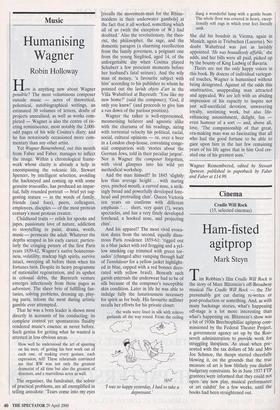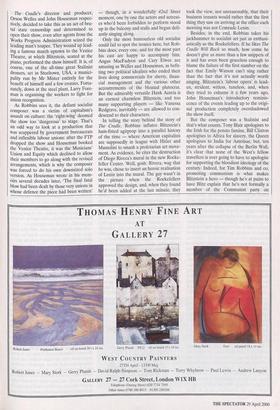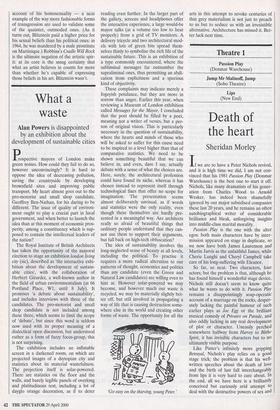Cinema
Cradle Will Rock (15, selected cinemas)
Ham-fisted agitprop
Mark Steyn
Tim Robbins's film Cradle Will Rock is the story of Marc Blitzstein's off-Broadway musical The Cradle Will Rock — the The presumably got cut during re-writes or post-production or something. And, as with many backstage stories, what's happening off-stage is a lot more interesting than what's happening on. Blitzstein's show was a bit of 1930s Brechtophiliac agitprop com- missioned by the Federal Theater Project, a government agency set up by the Roo- sevelt administration to provide work for struggling thespians. As usual when pre- sented with the tax dollars of Mr and Mrs Joe Schmoe, the thesps started cheerfully blowing it, on the grounds that the true measure of art is how blithely you disdain budgetary constraints. So in June 1937 FIT grantees were informed that they could not open 'any new play, musical performance or art exhibit' for a few weeks, until the books had been straightened out. The Cradle's director and producer, Orson Welles and John Houseman respec- tively, decided to take this as an act of bru- tal state censorship and determined to open their show, even after agents from the Works Progress Administration seized the leading man's toupee. They wound up lead- ing a famous march uptown to the Venice Theatre, at which Blitzstein, seated at the piano, performed the show himself. It is, of course, one of the all-time great Stalinist droners, set in Steeltown, USA, a munici- pality run by Mr Mister entirely for the benefit of himself and a few cronies. Fortu- nately, down at the steel plant, Larry Fore- man is organising the workers to fight for union recognition.
As Robbins sees it, the defiant socialist composer was a victim of capitalism's assault on culture: the 'right-wing' deemed the show too 'dangerous' to stage. That's an odd way to look at a production that was scuppered by government bureaucrats and inflexible labour unions: after the FTP dropped the show and Houseman booked the Venice Theatre, it was the Musicians' Union and Equity which declined to allow their members to go along with the revised arrangements, which is why the composer was forced to do his own downsized solo version. As Houseman wrote in his mem- oirs several decades later, 'The final fatal blow had been dealt by those very unions in whose defence the piece had been written' — though, in a wonderfully 42nd Street moment, one by one the actors and actress- es who'd been forbidden to perform stood up in the balcony and stalls and began defi- antly singing along.
Only the most humourless old socialist could fail to spot the ironies here, but Rob- bins does, every one, and for the most part his cast are happy to accompany him. Angus MacFadyen and Cary Elwes are amusing as Welles and Houseman, as befit- ting two political idealists who ended their lives doing commercials for sherry, finan- cial management and the various other accoutrements of the bloated plutocrat. But the admirably versatile Hank Azaria is an earnest charmless Blitzstein, and too many supporting players — like Vanessa Redgrave, inevitably — are allowed to con- descend to their characters.
In telling the story behind the story of The Cradle, Robbins inflates Blitzstein's ham-fisted agitprop into a parallel history of the time — where American capitalists are supposedly in league with Hitler and Mussolini to smash a proletarian art move- ment. As evidence, he cites the destruction of Diego Rivera's mural in the new Rocke- feller Center. Well, gosh. Rivera, wag that he was, chose to insert an heroic realisation of Lenin into the mural. The guy wasn't in the picture when the Rockefellers approved the design, and, when they found he'd been added at the last minute, they took the view, not unreasonably, that their business tenants would rather that the first thing they saw on arriving at the office each morning was not Comrade Lenin.
Besides, in the end, Robbins takes his jackhammer to socialist art just as enthusi- astically as the Rockefellers. If he likes The Cradle Will Rock so much, how come he doesn't give us more than a few snippets of it and has even been graceless enough to blame the failure of the first number on the fact that Emily Watson can't sing rather than the fact that it's not actually worth singing. Blitzstein's 'labour opera' is lead- en, strident, witless, tuneless, and, when they tried to exhume it a few years ago, John Houseman's introductory reminis- cence of the events leading up to the origi- nal production completely overshadowed the show itself.
But the composer was a Stalinist and that's what counts. Tony Blair apologises to the Irish for the potato famine, Bill Clinton apologises to Africa for slavery, the Queen apologises to India for Amritsar, but, ten years after the collapse of the Berlin Wall, it's clear that none of the West's fellow travellers is ever going to have to apologise for supporting the bloodiest ideology of the century. Indeed, for Tim Robbins and co, promoting communism is what makes Blitzstein a hero — though he's at pains to have Blitz explain that he's not formally a member of the Communist party on account of his homosexuality — a neat example of the way more fashionable forms of transgression are used to validate some of the quainter, outmoded ones. (As it turns out, Blitzstein paid a higher price for his sexual beliefs than his political ones: in 1964, he was murdered by a male prostitute on Martinique.) Robbins's Cradle Will Rock is the ultimate negation of the artistic spir- it: at its core is the smug certainty that what an artist believes in counts for more than whether he's capable of expressing those beliefs in his art. Blitzstein wasn't.




























































 Previous page
Previous page